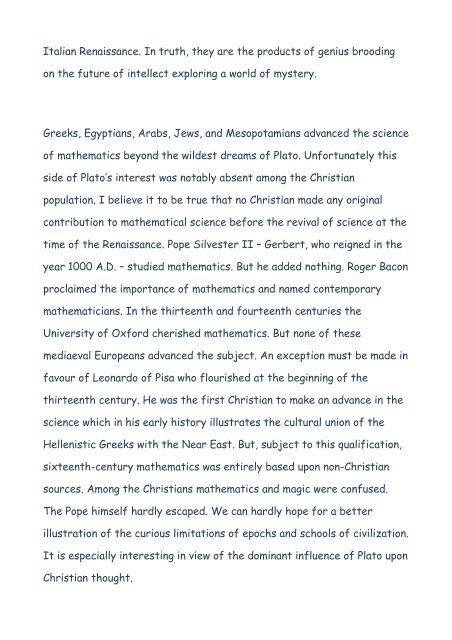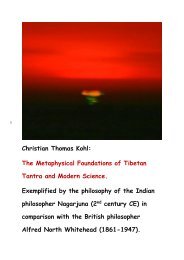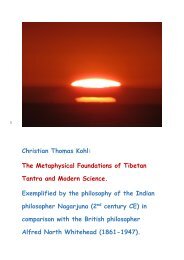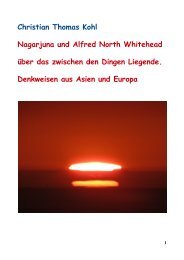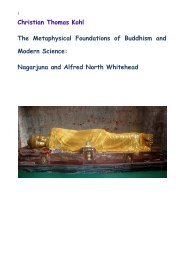Christian Thomas Kohl The Metaphysical Foundations of Buddhism and Modern Science
Christian Thomas Kohl The Metaphysical Foundations of Buddhism and Modern Science
Christian Thomas Kohl The Metaphysical Foundations of Buddhism and Modern Science
You also want an ePaper? Increase the reach of your titles
YUMPU automatically turns print PDFs into web optimized ePapers that Google loves.
Italian Renaissance. In truth, they are the products <strong>of</strong> genius brooding<br />
on the future <strong>of</strong> intellect exploring a world <strong>of</strong> mystery.<br />
Greeks, Egyptians, Arabs, Jews, <strong>and</strong> Mesopotamians advanced the science<br />
<strong>of</strong> mathematics beyond the wildest dreams <strong>of</strong> Plato. Unfortunately this<br />
side <strong>of</strong> Plato’s interest was notably absent among the <strong>Christian</strong><br />
population. I believe it to be true that no <strong>Christian</strong> made any original<br />
contribution to mathematical science before the revival <strong>of</strong> science at the<br />
time <strong>of</strong> the Renaissance. Pope Silvester II – Gerbert, who reigned in the<br />
year 1000 A.D. – studied mathematics. But he added nothing. Roger Bacon<br />
proclaimed the importance <strong>of</strong> mathematics <strong>and</strong> named contemporary<br />
mathematicians. In the thirteenth <strong>and</strong> fourteenth centuries the<br />
University <strong>of</strong> Oxford cherished mathematics. But none <strong>of</strong> these<br />
mediaeval Europeans advanced the subject. An exception must be made in<br />
favour <strong>of</strong> Leonardo <strong>of</strong> Pisa who flourished at the beginning <strong>of</strong> the<br />
thirteenth century. He was the first <strong>Christian</strong> to make an advance in the<br />
science which in his early history illustrates the cultural union <strong>of</strong> the<br />
Hellenistic Greeks with the Near East. But, subject to this qualification,<br />
sixteenth-century mathematics was entirely based upon non-<strong>Christian</strong><br />
sources. Among the <strong>Christian</strong>s mathematics <strong>and</strong> magic were confused.<br />
<strong>The</strong> Pope himself hardly escaped. We can hardly hope for a better<br />
illustration <strong>of</strong> the curious limitations <strong>of</strong> epochs <strong>and</strong> schools <strong>of</strong> civilization.<br />
It is especially interesting in view <strong>of</strong> the dominant influence <strong>of</strong> Plato upon<br />
<strong>Christian</strong> thought.


